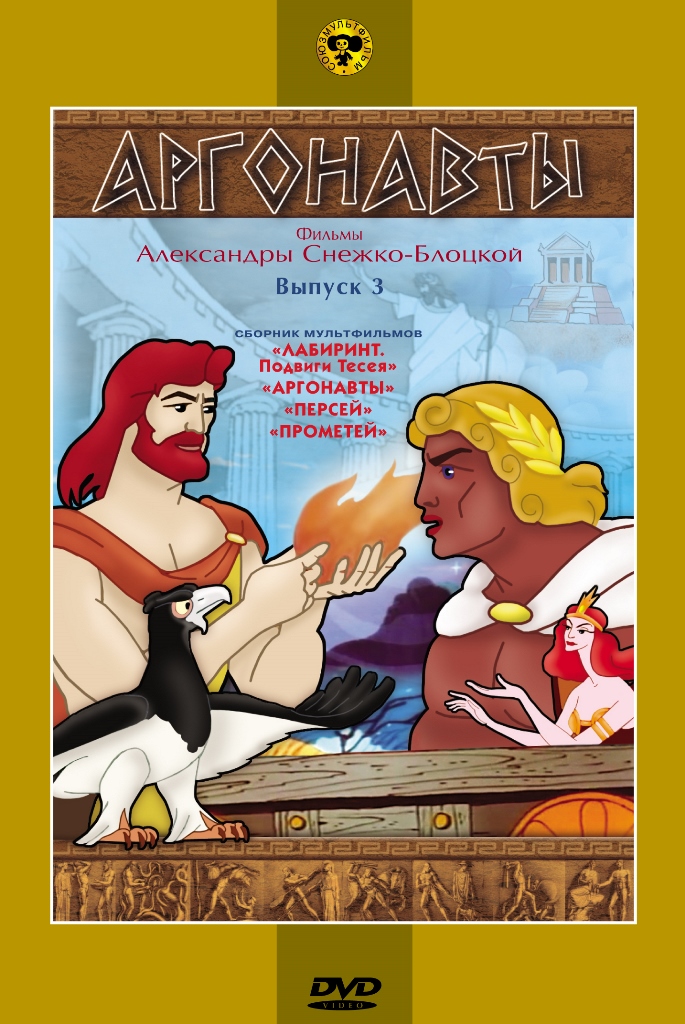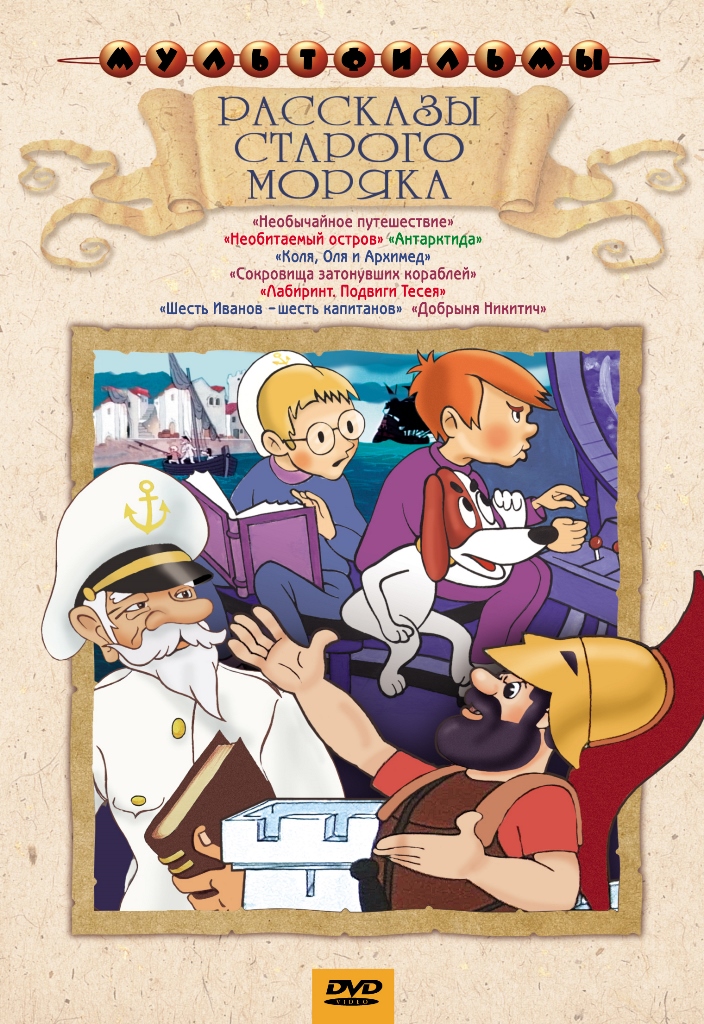Title of the work
Studio / Production Company
Country of the First Edition
Country/countries of popularity
Original Language
First Edition Date
First Edition Details
Лабиринт. Подвиги Тесея [Labyrinth. The Deeds of Theseus (Labirint. Podvigi Teseia)]. Directed by Aleksandra Snezhko-Blotskaia, Script by Aleksei Simukov. Legends and Myths of Ancient Greece 2. Moscow: Soyuzmultfilm, 1971.
Running time
Date of the First DVD or VHS
Genre
Animated films
Hand-drawn animation (traditional animation)*
Myths
Short films
Target Audience
Children (6+)
Cover

The cover of the entire series Legends and Myths of Ancient Greece.

Courtesy of the Film Video Association “Крупный план” [Close-up (Krupnyĭ plan)] close-up.ru, accessed: August 17, 2018.
Author of the Entry:
Hanna Paulouskaya, University of Warsaw, hannapa@al.uw.edu.pl
Peer-reviewer of the Entry:
Elżbieta Olechowska, University of Warsaw, elzbieta.olechowska@gmail.com
Susan Deacy, University of Roehampton, s.deacy@roehampton.ac.uk

Aleksei Simukov
, 1904 - 1995
(Screenwriter, Scriptwriter)
Aleksei Simukov was born in St Petersburg, in a family belonging to the intelligentsia. He received classical education at the Third Classical Gymnasium (the only one in St Petersburg where Greek and Latin was taught at the time). In 1925 Aleksei Simukov moved to Moscow. He studied at the art studio of Ilya Mashkov at the Association of the Artists of Revolutionary Russia (AKhRR) and also at the Maxim Gorky Literature Institute.
He began writing plays for theatre and cinema, including animation. He preferred comical and lyrical genres, following the tradition of the 19th-century Russian theatre.
Aleksei Simukov was a lecturer at the Maxim Gorky Literature Institute. He was a literary editor of the Soyuzmultfilm studio (1944–1946), worked at the Ministry of cinematography of the USSR (1947–1950), later at the Union of Soviet Writers (1950s), and still later at the Theatre Department of the Ministry of Culture of the USSR (1964–1971) having influence on the repertory of the theaters in the country.
In his memoirs Simukov writes about scripts for the movies of Aleksandra Snezhko-Blotskaia about the Greek mythology. He says that at that time he became fascinated by myths. They inspired him to continue developing this theme and he also wrote two plays about the Greek mythology. These were Гори, гори ясно (Burn, Burn, Brightly) about Heracles and Prometheus, and Взгляд Медузы (A Glance of Medusa) about Perseus.
His life spanned pre-revolutionary and post-Soviet Russia; he finished his memoirs in 1994, a year before he died.
Source:
Simukov, Aleksei, Чертов мост, или Моя жизнь как пылинка Истории [A Devil's Bridge or My Life as a Speck of History], Moskva: Agraf, 2008.
Bio prepared by Hanna Paulouskaya, University of Warsaw, hannapa@al.uw.edu.pl

Aleksandra Snezhko-Blotskaia
, 1909 - 1980
(Director)
Aleksandra Snezhko-Blotskaia was a Russian animator and movie director.
Born in Vovchansk in Kharkiv Oblast (today in Ukraine), she later moved to Moscow oblast and Moscow. In 1925–26 she studied at the Fëdor Rerberg Art School. In 1926 she joined an art studio at the Association of the Artists of Revolutionary Russia (AKhRR). She also studied at the Architecture and Construction Institute.
From 1934 she worked at animation. First, at the Союзкинотехника ([Soviet] Union Cinema Techniques), then at the Experimental Cartoon Studio directed by Victor Fëdorovich Smirnov, at the Межрабпомфильм (Movies for Workers International Relief). She started as animator, then for a long time worked as assistant-director for Ivan Ivanov-Vano. From 1956 she worked independently and produced film adaptations of fairy tales of different nations: Verlioka (a Russian folktale, 1957), Янтарный замок ([An Amber Castle], a Lithuanian folktale, 1959), Дракон ([A Dragon], a Burmese folktale, 1960–61), Чудесный сад ([A Miraculous Garden], a Kazakh folktale, 1962), Дочь солнца ([The Sun’s Daughter], a Chukchi folktale, 1964).
She also adapted Rikki-Tikki-Tavi (1965) and The Cat that Walked by Himself (1968) by Rudyard Kipling as well as Сказка о золотом петушке ([The Tale of the Golden Cockerel], 1967) by Alexander Pushkin.
In 1969–74 she produced a series of movies about Greek mythology commissioned by the Ministry of Education of the USSR: Возвращение с Олимпа (The Return from Olympus, 1969), Лабиринт – подвиги Тесея (Labyrinth, the Deeds of Theseus, 1970–71), Argonauts (1972), Perseus (1973), Prometheus (1974). It was the most important series of animated movies about Greek mythology ever made in the USSR. The Return from Olympus was the first movie in the series Legends and Myths of Ancient Greece.
Source:
Bogdanova, Siuzanna, “Очерки и жизни и творчестве Александры Гавриловны Снежко-Блоцкой” [Essays on the Life and Work of Aleksandra Gavrilovna Snezhko-Blotskaia], Кинограф 19 (2008): 207–240.
Bio prepared by Hanna Paulouskaya, University of Warsaw, hannapa@al.uw.edu.pl
Summary
Young Theseus finds his father’s sword and sandals and sets off for Athens. At the parting with Theseus, the Centaur Chiron advises him to use his strength only for good and promises a life full of great deeds. On the way to Athens, Theseus fights the Crommyonian Sow and Procrustes.
Having met his father, Theseus decides to free the country from the Minotaur and travels to Crete with the other Athenians sent as tribute. He promises his father that he will put up white sails as a sign that he is returning safe.
On Crete, Ariadne is looking for somebody who would kill the Minotaur; she gives a ball of thread to Theseus. He defeats the monster and saves the young men and women from a horrible death.
They go back to Athens at night and take Ariadne with them. In order to avoid pursuit, Theseus destroys the Cretan ships, but king Minos receives help from Dionysus, who takes Ariadne away (probably even brings her back to her father). Exhausted after a stormy night on the sea and devastated by the loss of Ariadne, Theseus does not change the black sails for white ones.
Seeing the ship with black sails, Aegeus throws himself off a cliff. The Centaur Chiron tells Theseus that, in memory of his father, the sea will be called the Aegean and that greater deeds still await him.
Analysis
This is the second movie in the series “Legends and Myths of the Ancient Greece”. The story is very simple and clear. All the “monsters” are perceived by the heroes as monsters. Theseus has no moral qualms, nor does he hesitate to do what must be done.
The episode with Procrustes has interesting connotations. When Theseus is resting on the bed and Procrustes measures him, the latter says: “I knew it. You do not fit within the limits of the standard… All the confusion in the world is due to the fact that there is no unified equal standard.”* This saying corresponds to the popular version of the myth, but at the same time “standard” or “norm” was very important concept for Soviet culture, where all the country had to fulfill prescribed norms every five years, or quality standard was to be adhered in all the sectors of industry and, even, culture. The words used in the movie refer to official language of the Communist Party materials and other documents. The episode of Procrustes was chosen probably in order to give etymological explanation of popular Russian saying “прокрустово ложе” (Procrustean bed) to viewer.
The movie also contains some obviously propagandistic elements. The Cretan palace is shown as a constructivist building, resembling German architecture of the pre-WW2 period. The door to the Labyrinth is similar to the entrance to the sanctuary of Moloch in Giovanni Pastrone’s Cabiria. Inside the Labyrinth, there are axes in the fascist style hanging on the walls and above portals. King Minos is presented as taking advantage of the monster for his own purposes (e.g. he says to his daughter: “Minotaur is our support. Our enemies are afraid of us, and this is good”).
Theseus is a hero who shares Soviet values. He denies his own interests in order to help the weak. He urges the young Athenians: “Keep together”, aiming to save every person. He fights the enemies of the Soviet people. He is not even guilty for the death of his father, since he had no possibility of changing the sail because of the storm and afterwards because of his grief over Ariadne.
* “Я так и знал. Ты не укладываешься в пределы нормы… Вся путаница в мире происходит от того, что нет единой равной нормы”.
Further Reading
Bogdanova, Siuzanna [Сюзанна Богданова], “Очерки о жизни и творчестве Александры Гавриловны Снежко-Блоцкой” [Essays on the Life and Work of Aleksandra Gavrilovna Snezhko-Blotskaia (Ocherki o zhizni i tvorchestve Aleksandry Gavrilovny Snezhko-Blotskoĭ)], Kinograf 19 (2008): 207–240.
Simukov, Aleksei [Алексей Симуков], Чертов мост, или Моя жизнь как пылинка истории [The Devil's Bridge or My Life as a Speck of History (Chёrtov most, ili Moia zhizn' kak pylinka istorii)], Moskva: Agraf, 2008.
Profile at animator.ru (accessed: August 17, 2018).
Profile at imdb.com (accessed: August 17, 2018).
Profile at kinopoisk.ru (accessed: August 17, 2018).
Addenda
The Remaining Production Credits:
Music by Vitaly Geviksman (1924–2007); Cinematography by Boris Kotov (1922–1984); Art direction by Aleksandr Trusov (1912–1988); Sound director Boris Filchikov;
Animators: Boris Butakov; Yuri Butyrin; Nikolai Fëdorov; Leonid Kaiukov; Elizaveta Komova; Olga Orlova; Viktor Shevkov; Oleg Safronov.
Date of the First VHS and DVD Edition:
According to Wikipedia, the movie was released in the 1980s on VHS in the series “Видеопрограмма Госкино СССР” [Video program of the State Committee for Cinematography of the USSR (Videoprogramma Goskino SSSR)]. I have been unable to confirm this information.
The movie was released on DVD in 2009 by Film Video Association “Крупный план” [Close-up (Krupnyĭ plan)] in a collection of movies called Аргонавты. Фильмы A. Снежко-Блоцкой, вып. 3 [The Argonauts. Movies by A. Snezhko-Blotskaia, Disc 3 (Argonavty. Filmy A. Snezhko-Blotskoĭ, vyp. 3))]. The DVD also contained the movies Аргонавты [The Argonauts (Argonavty)], Персей [Perseus (Perseĭ)] and Прометей [Prometheus (Prometeĭ)]. The DVD has been reissued since then.
It was also released on DVD by the same company in a collection of movies called Рассказы старого моряка [Stories of the Old Sailor (Rasskazy starogo moriaka)] together with movies of Lev Milchin Extraordinary Travel, Desert Island, Antarctica, a film of Anatoly Karanovich Six Ivans — Six Captains; a film of Yuri Prytkov Kolya, Olya and Archimedes and two other films about sea travels.
All links accessed: February 21, 2019.


